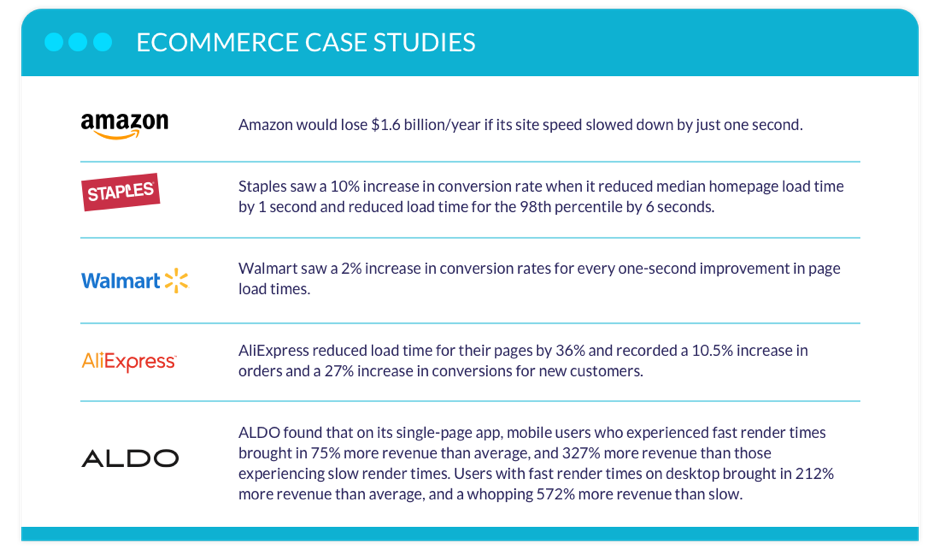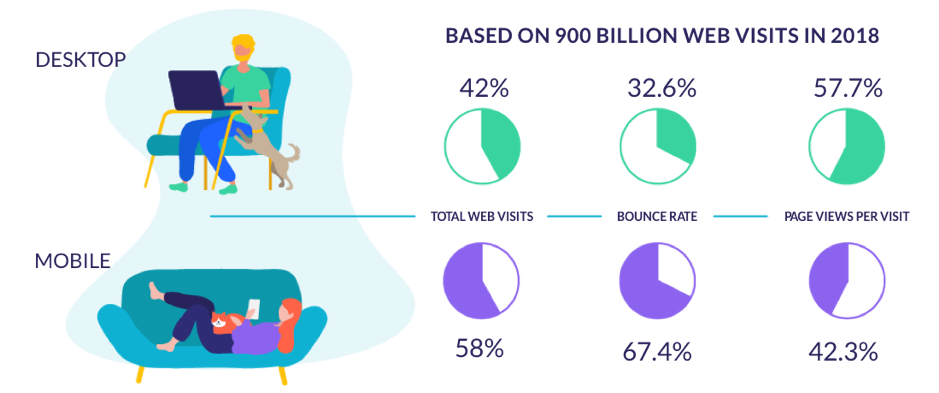Making sure your website loads quickly is a crucial step in keeping bounce rates low and search engine rankings high. But perhaps the most important result of a fast website is the increase in sales that you’re likely to see.
When it comes to sales, every second counts – even a one second delay will reduce customer satisfaction by 16%.
Site speed, and customers’ expectations about it, differ between mobile and desktop devices. But in both cases, it’s important to create the speediest ecommerce website that you can in order to keep your customers happy, and your conversion rate up.
Web Speed Impacts Everyone
It’s not just small, mom-and-pop stores that need to worry about how site speed affects their business. In fact, larger online stores have even more to lose – for example, if you’re running an ecommerce site that makes $100,000 per day, then a one-second page delay could cost you $2.5 million per year in lost sales. Even the most well-known ecommerce giants aren’t immune to the effects of load speed:

40% of consumers will wait no more than three seconds before abandoning a site – that’s two in five hard-earned potential customers walking right back out the door before they’ve even had a look around.
Every Split Second Counts
Website load time isn’t just a matter of “fast” and “slow” – seconds, and even tenths of seconds, can make all the difference!

Fast Sites Keep Customers
Providing a great experience for your customers is a surefire way to drive up sales, and it’s easy to lose out to the competition when you don’t deliver. 79% of online shoppers who have a dissatisfying experience are less likely to buy from the same site again, while 64% would simply purchase from a different online store.
But more specifically, how does website speed impact customer loyalty?
- 14% of customers will begin shopping on another site if they have to wait for a page to load
- 18% of shoppers will abandon their cart if pages are too slow
- 46% of online buyers say checkout speed is the #1 factor that determines whether they will return to a site
- 51% of online shoppers in the US say that site slowness is the top reason they’d abandon a purchase
Mobile vs Desktop
It’s no secret that mobile pages load slower than desktop pages. One analysis of 5 million desktop and mobile pages even found that the average time it takes to fully load a webpage is 10.3 seconds on desktop, versus 27.3 seconds on mobile.
This disparity is even more surprising when you consider that mobile is the preferred method of browsing. Mobile internet traffic makes up 50.44% of total online traffic, and about a quarter of US adults say they are “almost constantly” online.
In a 2018 study of US web traffic, mobile devices accounted for 58% of site visits and 42.3% of total time spent online. In short, mobile browsing is simply more convenient and more popular than desktop browsing, even though the latter offers a better user experience.

What are the most common problems on mobile?
46% of people say waiting for pages to load is what they dislike most about browsing the web on mobile. 60% of mobile internet users say they’ve encountered at least one problem while browsing within the last 12 months.
Of those mobile users, how many have encountered a website that…
- Was too slow to load? 73%
- Crashed, froze, or received an error? 51%
- Had formatting that was difficult to read? 48%
- Didn’t function as expected? 45%
- Simply wasn’t available? 38%
Customer Expectations on Mobile vs Desktop
When it comes to waiting for pages to load, most consumers think they’re more patient than they actually are. Even after the fact, customers remember online loading times as being 35% longer than they really were.
85% of mobile users expect pages to load as fast or faster than they do on desktop – and one study of UK consumers even found that 14% of shoppers expect pages to load instantly on mobile.
But if you’re looking for a more realistic goal, 64% of smartphone users expect pages to load in under four seconds, and 74% of mobile users in the US would abandon mobile sites that don’t load within five seconds.
To Recap…
Website speed affects everything from bounce rates to rankings, and this will all be reflected in your bottom line. When an ecommerce website is slower than its competition – even by a tenth of a second – there are a lot of potential customers at stake!
Customers’ expectations also differ for mobile and desktop devices, but that doesn’t mean you should let your guard down. Mobile sites might load a little slower, but they still account for the majority of website visits – and customers still expect a good experience on the go!
